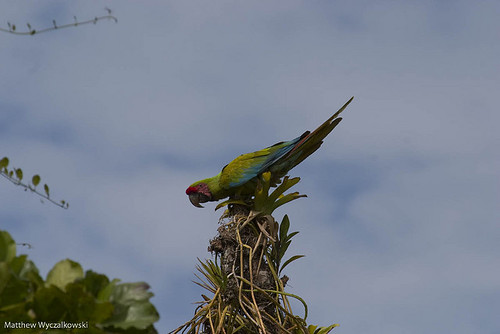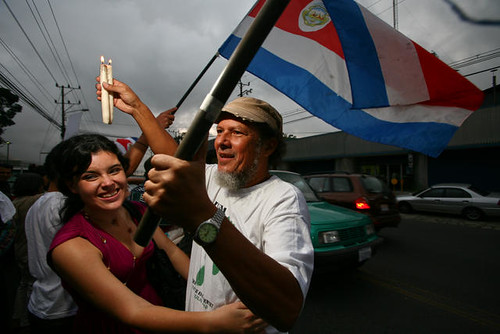 Environmentalists warn gold mine would further endanger threatened species like the great green macaw. Image by Matt WyczalkowskiConstitutional Court to rule on open pit gold mine along the Nicaraguan border.
Environmentalists warn gold mine would further endanger threatened species like the great green macaw. Image by Matt WyczalkowskiConstitutional Court to rule on open pit gold mine along the Nicaraguan border.
An open-pit gold mine may seem out of place in Costa Rica, self-touted as a world leader in eco-friendly policies. For President Óscar Arias, however, his push for what would become Costa Rica´s largest gold mine, does not contradict the tiny country´s environmental ideals, which includes becoming carbon neutral by 2021. Instead, he called the Las Crucitas gold project, near the border with Nicaragua, one of “public interest.”
Fervent opposition to the project has since driven the case to the country´s highest judicial court.
The seven-judge panel of the Supreme Court´s Constitutional Chamber is currently debating whether the mine, owned by Canada´s Infinito Gold Ltd., can move forward.
In October 2008, Arias, whose four-year term ends next year, issued a decree that ended a moratorium on the US$66 million-project, which is estimated to hold 1.2 million ounces of gold. The measure allowed forest clearing to resume in the area. Environmentalists argue that the zone is home to endangered species such as the great green macaw, which feed on the area´s almond trees. The company has countered that the bird had not been spotted during a survey of the area with judges and another court personnel and that the trees they had felled were part of secondary, not native, forest.
Defending mining
"Nicaragua has 14 mining projects, even from the Las Crucitas company, and I think that the rest of Latin America has similar projects or maybe even bigger ones," Arias said in October 2008, defending his decree.
But the mine´s activities were suspended shortly after his decree was issued, when 19 injunction requests, citing potential pollution, deforestation and other environmental and health damages, were filed with the Supreme Court. Arias´ then-Environment Minister Roberto Dobles, who advised that Las Crucitas was environmentally sound, resigned in March after coming under fire for granting a non-metallic mining concession to a local company whose board included his uncle.
The Attorney General´s Office is currently investigating both Arias and Dobles for the October 2008 decree, but has suspended its activities until the Supreme Court ruling.
In mid-November, the judges heard three days of testimony from environmentalists, scientists, local villagers and company officials.
The company argues that the mine will generate close to 300 jobs and 1,300 indirect jobs, in an area with few labor opportunities.
Andres Soto, a company spokesman, dismissed the environmental accusations.
"This is false," he said. "Crucitas is going to have a high-technology plant" that will contain the cyanide, a potentially toxic chemical used in gold mining, in five cement tanks.
"This is one of the principal strengths that Crucitas has," he added. "This means that the cyanide is going to be contained within the plant. It´s not going to have contact with the environment."
But Costa Rica, like other Central American nations, is prone to natural disasters, such as earthquakes, hurricanes, floods and landslade that can cause the toxic chemicals used in gold extraction and processing to spread far beyond the originally contained area, something that the government and mining company has overlooked, said Alberto Cortés, a political and environmental sciences professor at the University of Costa Rica and a coordinator for a team of experts who presented one of the injunction petitions.
The court has until Dec. 17 to issue a ruling on the most recent case, which compiled the 19 injunction requests, in one final, 20th petition.
Environmental fears on both sides of the border
Costa Rican environmentalists are not the only ones with complaints about the project. The Las Crucitas mine, from which the company expects to mine 85,000 ounces of gold a year, sits near the border with Nicaragua, with whom Costa Rica has often had tense relations over immigration and border issues. In July of this year, the International Court of Justice ruled that the San Juan River, the waterway that divides the two Central American countries, is Nicaraguan territory, but that Costa Rica has rights to its closest bank.
But the San Juan River is the closest major waterway to the mine, and Nicaragua´s government and Costa Rican environmentalists have found a point of conciliation over the project. Nicaraguans, including President Daniel Ortega and several lawmakers, have protested and called Las Crucitas a threat.
"The government of Nicaragua should take greater action such as going to international conventions to stop this project that could affect its surface waters and regional acquifiers," said Marco Tulio Araya, of the Costa Rican environmental organization Union por Vida, or Unovida.
According to Infinito, the project could expand even more, as its exploration concession is around 800 square kilometers.
Poor environmental legacy for Arias
Costa Rica´s government seeks to step up the country´s image as an eco-friendly paradise in Central America, but infrastructure, real estate, mining and other industries undermine these efforts, some environmentalists argue. Chemical open-pit mining poses a particular threat, said Cortés.
"This is the government that has caused the most damage to the environment in the last 50 years," said Cortés. "There is no comparison in terms of exploiting natural resources."
 City Parrots
City Parrots
